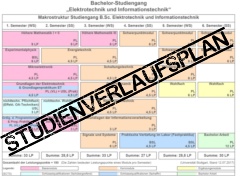The ongoing digitalization of all areas of work and life is leading to enormous amounts of data (big data), e.g. machine data in factories, sensor data from cars or social media data from the web. In order to make these data usable for various organizations, they have to be analyzed and processed profitably. On the one hand, analytical questions have to be created for predefined goals in order to derive the necessary IT and analysis architectures, e.g. to reduce waste through pattern-based analysis of quality data in production. On the other hand, the potential of different data sources have to be recognized in order to develop appropriate analysis methods and data management concepts, e.g. for new, data-driven services of an automobile manufacturer based on traffic, weather and social media data. Knowledge and skills in the field of artificial intelligence (AI) and data science are essential for all these tasks. You will acquire these in our Artificial Intelligence and Data Science degree program at the University of Stuttgart.
The Study Choice Compass B. Sc. Artificial Intelligence and Data Science provides an additional overview over the study program.
The Bachelor's program in Artificial Intelligence and Data Science is designed for six semesters. The first three semesters form the basic studies, the last three semesters are used for specialization. The degree programme is divided into compulsory and elective areas. Courses in the compulsory area are mandatory for all study participants, while within the elective areas priority areas can be set independently.
In the first three semesters, students are introduced to the theoretical and mathematical foundations of computer science as well as artificial intelligence and data science. Programming skills are acquired and consolidated. From the third semester onwards, these basic abilities are deepened and expanded. Further compulsory subjects in data science and artificial intelligence are provided for this purpose, as well as two elective catalogs in which you can select your own individual focus. In the project Artificial Intelligence and Data Science, the skills acquired are applied in practice, thus establishing a link to later professional activity in industry. In the elective area, you also have the opportunity to take an application subject worth up to 12 ECTS credits and thus specialize further for the professional world. At the end of your studies, you will be able to apply all the knowledge you have acquired and write your first own scientific paper - the Bachelor's thesis.
Modules
The degree programme is divided into modules for which the credit points (ECTS). They will be asigned after passing the module examination or after passing all module partial examinations. Modules have a size between 3 and 18 ECTS. The modules comprise content-related courses and extend over one or two semesters at most.
Module handbook
Detailed descriptions of the individual modules can be found in the Module handbook of the respective degree program. However, since the module manuals of the individual degree programmes must be revised and, if necessary, updated every semester, you will find the current version of the module handbook of your degree programme for the current semester in the C@mpus system.
ECTS Credit Points
During the course of study, ECTS credit points have to be acquired by passing modules. The average number of ECTS credits per semester is 30. One ECTS credit corresponds to a workload of about 30 hours. ECTS credits are therefore a quantitative measure of the time required for the study. A total of 180 ECTS credits are required for the Bachelor of Science.
The formal requirements for the Bachelor's degree program in Artificial Intelligence and Data Science are the general university entrance qualification (Abitur) or a corresponding equivalent qualification as well as qualifying knowledge of German, as the main language of instruction is German.
In addition, English language skills have to be proven as well at least at level B2. Almost always the language level is mentioned on the school leaving certificate. Previous knowledge of programming is not required, but it helps to get started. Sound mathematical knowledge is particularly recommended in order to be able to follow the study contents adequately.
Since the change from school to university is often perceived as difficult, especially in the so-called MINT subjects (mathematics, computer science, natural sciences, technology), the University of Stuttgart offers both preparatory courses and semester-accompanying courses for support in these subjects. Information on this can be found on the pages of the MINT-Kolleg.
The degree program B.Sc. Artificial Intelligence and Data Science has a restricted admission (30 places). An application is only possible for the winter semester of each year. It takes place online via the C@mpus portal of the University of Stuttgart. Information and forms can be found in the application information of the Central Student Advisory Service. The complete application documents must be uploaded to the C@mpus portal by 15 July of each year. Paper documents are only required for enrollment.
Deadlines
for the winter semester: July, 15
for the summer semester: April, 15 (entrance into a higher semester only)
For all further information, inquiries, individual advice, etc., our student advisory service is at your disposal. For general application questions, the pages of the Registrar's Office will also help you.
Our graduates work in a wide range of fields. Data processing and artificial intelligence are becoming increasingly important in both industry and research. Thanks to their specific training, our graduates are particularly qualified for professional and research fields that centrally deal with the procurement, administration and utilization of data as well as the use of AI in the handling and evaluation of large amounts of data. Because of their understanding of mathematics and information science, our graduates can be employed in a wide range of IT areas, from data acquisition, management, analysis and visualization to the implementation of entire software systems for data processing. Examples of applications can be found in the healthcare sector, the financial world, e-commerce, the automotive industry, retail, building services engineering and many more.
A good Bachelor's degree qualifies for a Master's degree program in Germany and Europe, especially for the Master's programs in the Department of Computer Science at the University of Stuttgart.
A Bachelor's degree is one of several prerequisites for an admission to a Master's program. Admission can also take place conditionally, i.e. previous to the successful completion of the Bachelor's degree. Currently, there are the following Master's degree programs in the Department of Computer Science:
- M.Sc. Informatik
- M.Sc. Software Engineering
- M.Sc. Artificial Intelligence and Data Science
- M.Sc. Computer Science (English program)
- M.Sc. Computational Linguistics (English program)
- M.Sc. Autonome Systeme (in cooperation with the Department of Electrical Engineering and the Faculties 4 and 7)
- M.Sc. Information Technology (English program; in cooperation with the Department of Electrical Engineering).
The four-semester Master's programme usually comprises 120 ECTS credits; its contents are research-oriented. The Master's degree is generally the prerequisite for a doctorate and further scientific work at the university or at any other research institution.
Ansprechpartner zum Studiengang Artificial Intelligence and Data Science

Katrin Schneider
Dr.Program Manager, Department Manager & Erasmus Coordinator of the Computer Science Department
- Profile page
- +49 711 685 88520
- Write e-mail
- Hint: Due to the application processing the office is closed until 28.07.2025 (including).





